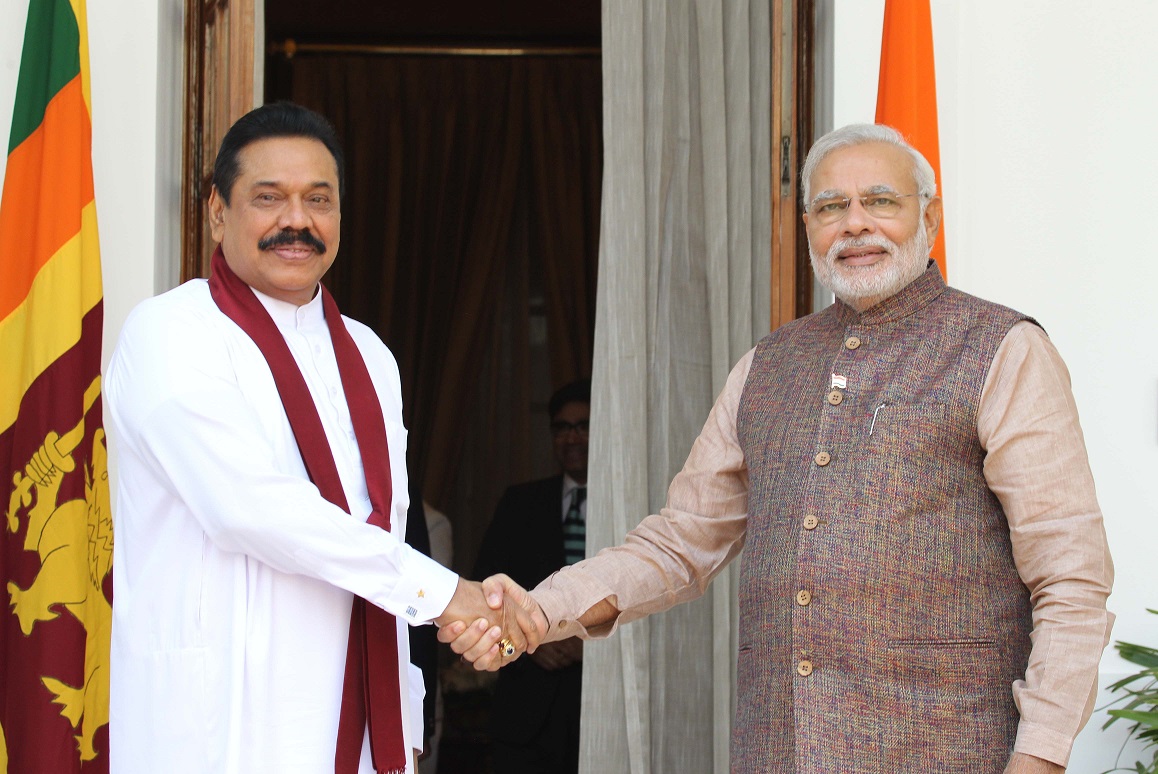PM Modi Loses a Friend
Rajapaksa with Modi

NEW DELHI: Prime Minister Narendra Modi has lost a friend in Mahinda Rajapaksa, now former President of Sri Lanka. And Indian efforts to support him have come a cropper, with the new President-elect Maithripala Sirisena being elected to office with a more inclusive Sri Lankan vote amidst a promise of reviving the institutions of democracy.
Relations between Rajapaksa and PM Modi were always sound, but could not proceed openly along anticipated lines because of the protests from the Tamil Nadu political parties in India. In fact the grand political alliance stitched up by the BJP just before the Lok Sabha elections last year fell apart as a result of this pressure with MDMK led by Vaiko walking out in protest against the BJP’s “anti-Tamil” stance.
The MDMK district secretaries met in Chennai and adopted an unanimous resolution to leave the NDA that the party had joined right on the eve of the Lok Sabha elections. The top rung of the party urged that India should not support Sri Lanka.Vaiko moved the resolution stating that, “MDMK can no more be part of the BJP-led NDA as the saffron party-led government has been insensitive to a host of issues concerning Tamil Nadu including Mullaperiyar dam issue”.
“BJP has been acting against Tamils. Modi wished Mahinda Rajapaksa for elections (there). Modi government is silent on Subramanian Swamy’s proposal for Bharat Ratna for Rajapaksa”, the resolution stated.
BJP leader Subramanian Swamy had been pushing for deeper relations between Modi and Rajapaksa, including the Bharat Ratna that Vaiko’s resolution referred to. During the presidential elections media reports spoke of the social media campaigner Arvind Gupta of the BJP helping the Rajapaksa campaign. Both sides denied this but the report made the rounds nevertheless, with Rajapaksa himself often speaking openly of his close friendship with PM Modi. Interestingly cine idol Salman Khan also campaigned for Rajapaksa with Indian Tamil groups demonstrating outside his residence.
The genocide of Tamils in Sri Lanka kept all political parties, including the ruling AIADMK and DMK on the alert insofar as Rajapaksa and PM Modi were concerned. The invitation to the former by the latter for his oath taking ceremony was opposed, with the political leaders in Tamil Nadu making it clear that they would not tolerate further deepening of relations with the Sri Lankan President. And protested loudly at any and every gesture suggesting deepening of ties.
Despite this the duo managed to meet thrice. Once at the oath taking ceremony in Delhi, then again later on the sidelines of the United Nations General Assembly and the third time on the sidelines of the Saarc summit in Kathmandu. New Delhi did not highlight the meetings, but Sri Lanka had no such compunctions. After the meeting in New York for instance Sri Lanka sought to emphasise the bonhomie between PM Modi and Rajapaksa, and how they had agreed to work together on a host of issues including the vexed issue of fishermen. In fact subsequently at the Saarc meet PM Modi reportedly thanked Rajapaksa for releasing some Indian fishermen. This despite ballistic responses from the Tamil Nadu political parties that finally parted ways, with the grand alliance falling apart in the process.
The new government under former Minister and now of course the man who led the Opposition charge in these elections Maithripala Sirisena could come as an opportunity for New Delhi. More so, as he does not have the genocide tag attached to him and the government here might thus find it easier to do business with him without attracting the ire of the political parties here in Tamil Nadu. A great deal will depend on Sirisena and the course he decides to follow, with all eyes on him to see whether he moves away from the executive Presidential system brought in by Rajapaksa to a democratic and more inclusive establishment. He has the advantage of coming to power with a section of the minorities and Tamil vote along with Sinhalese support.
Sirisena was a low profile minister and while backed by powerful political weights in Sri Lanka has to still establish himself. PM Modi had a ‘ready made’ friend in Rajapaksa who was the first Saarc leader to congratulate him and accept his invitation to attend the oath taking ceremony. Interestingly former fisheries minister Rajitha Senaratne has claimed that the Sri Lankan opposition was influenced by PM Modi’s election campaign, drawing into the reservoir of frustration against Rajapaksa just as he had done for the Nehru-Gandhi family. This could then constitute a meeting, and the loss of a friend be turned into an opportunity for PM Modi to strengthen relations with Sri Lanka without fear of reprisals from Tamil Nadu.



